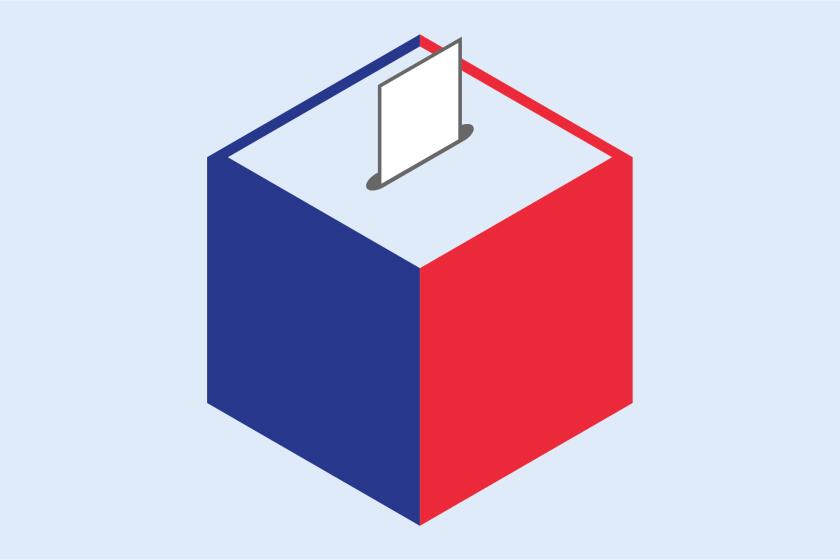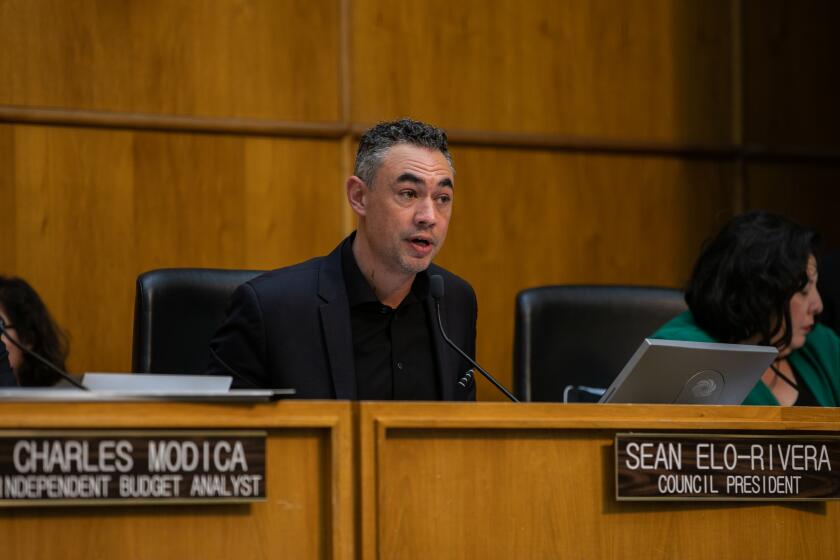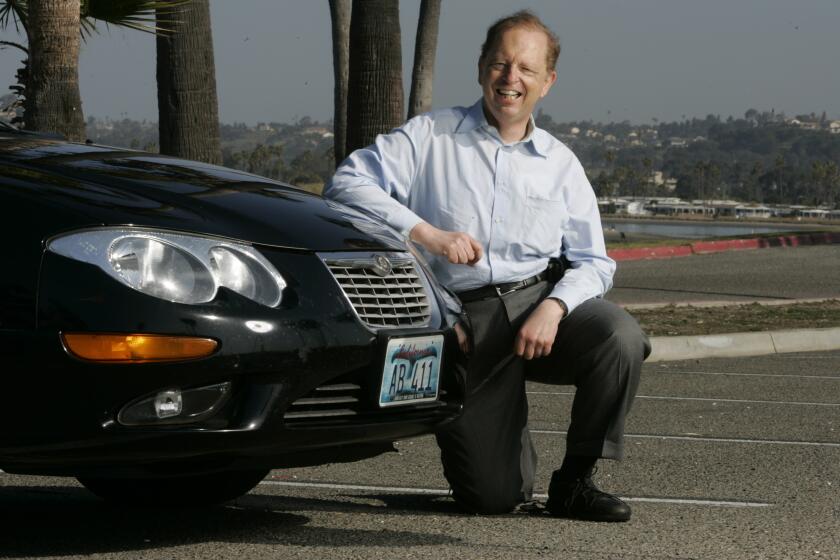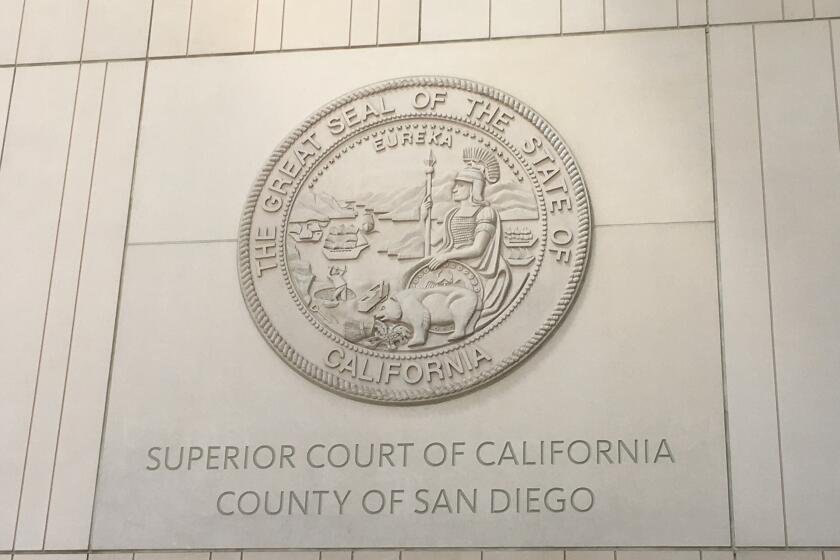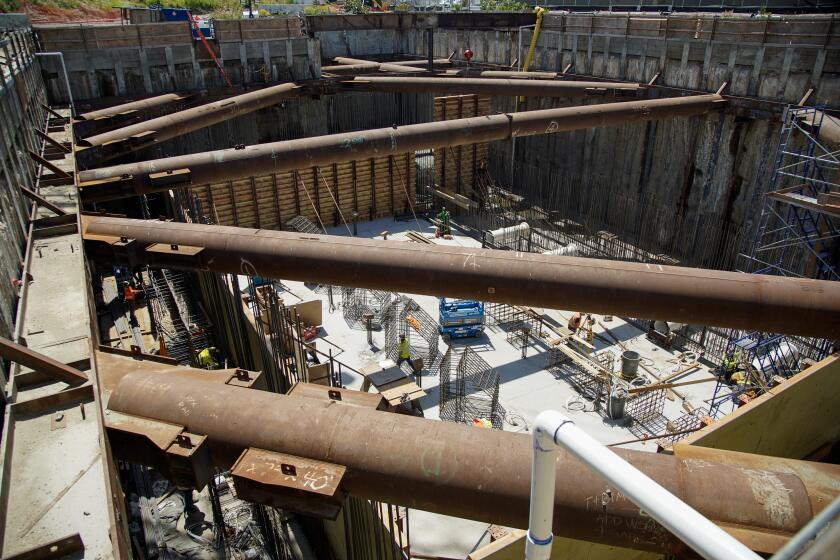Chargers dispute risks of stadium measure
Opponents say the Chargers stadium ballot measure is fraught with a variety of risks for taxpayers and local tourism, but team officials say each of the concerns raised is either misleading, overblown or flat-out false.
In a five-page online attack, the “No Downtown Stadium” coalition says the Chargers are underestimating construction costs and that their plan would increase the risk of losing Comic-Con, jeopardize tourism marketing and underutilize downtown’s last remaining piece of prime land.
CHARGERS STADIUM: COMPLETE COVERAGE
Chargers spokesman Fred Maas said in a recent interview the team’s plan has a large financial “cushion” for cost increases and that Comic-Con’s objections to the proposed stadium and convention center annex are based on misinformation.
Maas also said money for tourism marketing would only shrink if there is an unprecedented economic crisis, and that the proposed project is a smart use of land because it would spur a flurry of downtown economic development.
City funds jeopardized?
The No Downtown Stadium coalition also says the city might struggle to pay for essential services like police and firefighters if the plan’s hotel tax increase from 12.5 percent to 16.5 percent fails to generate enough additional revenue for construction and maintenance.
A taxing argument over ballot, stadium
“If hotel spending drops for any reason over the next 30 years, San Diego residents would have to pay the difference,” the coalition says in its online material. “And there are many reasons hotel spending could drop, including lost conventions and an economic downturn.”
Maas called that claim “infuriating” and contends that it’s completely false.
“The taxpayers are never on the hook,” Maas said. “It would be malfeasance if any fiduciary responsibilities applied to them. The folks who would be on the hook are people that would be buying the bonds, not the city.”
The Chargers’ proposal, if approved by two-thirds of voters on Nov. 8, would create a public stadium authority that would sell bonds to generate many millions for construction and then pay off those bonds over 30 years with revenue from the higher hotel tax.
The authority wouldn’t be able to find investors to buy the bonds if financial experts consider the plan too risky, Maas said. If the investors are willing to buy the bonds, then they would take the risk of revenues not being sufficient, he said.
Maas said the only potential effect of insufficient hotel taxes on the city’s operating revenue, known as the general fund, is that the Chargers propose sending into the general fund any excess hotel tax revenue not needed for construction or maintenance.
Maas said a severe decrease in local tourism could jeopardize the city’s chances of getting that excess revenue, but he stressed that the measure guarantees the general fund will continue to receive the 10.5 percent in hotel tax revenue it currently receives.
So there won’t be any reduction in general fund revenue from hotel taxes, and the city won’t be in a position where they have less hotel tax revenue than today for police officers, firefighters, infrastructure or other essentials, Maas said.
He also stressed that the hotel tax hike is projected to generate significantly more revenue than needed, making the chances of insufficient revenue extremely remote.
Financial models used by the Chargers include two notable recessions over the 30 years of bond repayments, one similar to the recession after the 9/11 terrorist attacks and another as large as the Great Recession that began in 2007.
But there would still be enough money to cover everything the Chargers have proposed, Maas said.
“We can assume Armageddon narratives worse than what we used, but that’s completely unrealistic, unfair, misguided and misleading,” he said.
Maas said the Chargers were careful to stay away from proposals that would entangle the city’s general fund, noting that the infamous ticket guarantee is an example of such an approach turning awry.
“We knew politically we didn’t want to be in a position where we were being fairly criticized that we could be affecting 9-1-1 response, infrastructure or any other important services,” he said. “And the Chargers have gone through these experiences with effective guarantees and backstops from the general fund and never want to experience that again.”
Rent and cost overruns
Critics also complain that the Chargers wouldn’t pay rent for the new stadium, but Maas said that’s a misunderstanding based on word choice in the ballot measure.
While the measure doesn’t use the word “rent,” it obligates the Chargers to pay all annual operations, maintenance and security costs for the stadium portion of the project beyond a $15 million contribution that will come each year from the fund receiving the higher hotel tax revenues.
Maas said the Chargers will end up paying somewhere between $15 million and $25 million based on other stadiums, where maintenance, operations and security typically cost between $30 million and $40 million annually.
The No Downtown Stadium coalition says it’s unfair that the Chargers’ annual contributions would shrink if the stadium hosts non-football events that generate revenue for operations and upkeep. Maas said it makes sense for those costs to be shared if the facility has multiple users.
On potential cost overruns, the No Downtown Stadium coalition say the Chargers proposal likely underestimates the cost of the project because it’s a “guess,” because cost overruns for stadiums are common and because acquiring necessary land includes expensive hurdles.
They’ve focused in particular on the need to provide the Padres additional parking in downtown, at a potential cost of $75 million, because the proposed project would be built on Tailgate Park.
Maas said the Chargers’ built a financial cushion into their plan to cover such expenses, including the need to relocate the Metropolitan Transit System’s bus yard nearby.
He said taxpayers don’t face risk from potential cost overruns because the stadium authority, if voters approve the measure, would be responsible for covering all of the costs with the additional hotel tax revenue.
“If that’s not possible, it will be impossible to sell the bonds and the project won’t move forward — period,” Maas said.
Maas said it’s possible and probably likely that the $1.8 billion estimate will increase, stressing that it’s based on 2017 dollars.
He noted that the Chargers’ plan includes construction cost index escalators that require increases over time in the contributions from the team and the hotel tax fund.
Tourism marketing funds and Comic-Con
On tourism marketing money, the No Downtown Stadium coalition says the Chargers’ proposal would reduce it by half.
It’s true the city’s 2 percent tourism fee would be eliminated and only 1 percent of the new 16.5 percent hotel tax would be allocated to tourism marketing.
But that would increase to 2 percent once enough revenue from increased hotel taxes meets a minimum reserve required by the bond sales. And Maas said that money isn’t in jeopardy in the Chargers’ financial models, the same models that include two significant economic downturns.
On increasing the risk of losing Comic-Con, the No Downtown Stadium coalition says local voters need to listen when Comic-Con says it strongly prefers a contiguous expansion of the existing convention center over the Chargers proposal.
“Most of us know that the customer is always right,” the coalition says. “Comic-Con has said an off-site annex, like the one the Chargers have proposed, could actually make their situation worse by opening up convention space for competing events.”
Maas said the risk of losing Comic-Con stems more from poor leadership at the city and the convention center than the Chargers proposal.
He suggested that local leaders have given Comic-Con the false impression that a contiguous expansion is easily doable, but he noted that such an expansion has been blocked in court. He also said critics exaggerate how far away the proposed convention center annex would be.
“The notion that somehow this off-campus facility, which is really on-campus, is going to have deleterious effects is unfair,” Maas said. “It’s very important to us to build Comic-Con a facility that accommodates them and their needs. They are as important to the fabric of this community as we are.”
Failed stadium-convention facilities
No Downtown Stadium also cites an independent study by Chicago-based HVS consulting that says combined football stadiums and convention centers have largely failed in St. Louis, Indianapolis and Atlanta.
Maas said the study suffers from mischaracterizations and “poor assumptions,” noting that the Chargers have offered to have their experts publicly debate the authors.
On whether the Chargers’ proposal would underutilize downtown’s last remaining piece of prime land, No Downtown Stadium says the project would create far less property tax revenue and jobs than alternate potential developments such as offices or housing.
Maas called that argument “a crock,” contending the stadium and convention center annex would be a catalyst to more intense development than could ever happen otherwise, generating more tax revenues for the city.
“The day this initiative gets approved there’s going to be a mad flurry of activity,” said Maas, predicting that multiple proposals for hotels and other projects would quickly emerge. “It’s going to happen.”
Tony Manalatos, chief spokesman for the No Downtown Stadium coalition, said his group stands by their criticisms.
“Fred is taking issue with independent financial reviews of their tax measure, fact checks by respected journalists and specific provisions the Chargers included in their tax measure,” Manolatos said Friday.
Maas said it appears the coalition is desperate to convince voters to oppose the measure and is searching for any arguments it can find.
“Tony has spun more mud than a monster truck competition,” Maas said. “He continues to spin mud to see what will get traction.”
The Chargers’ measure was officially named Measure C this week. The complete text of the 119-page proposal will appear in sample ballots mailed to voters this fall.
RELATED

Fred Maas on the challenge of parking if a new stadium is built downtown

Chargers special adviser Fred Maas on the team’s stadium plan.


